Entrepreneurship and Small Business
VerifiedAdded on 2020/11/23
|18
|5013
|425
Report
AI Summary
This assignment delves into the world of entrepreneurship and small businesses. It examines core concepts, analyzes the impact of business training programs on microfinance clients and institutions, and explores the significance of human capital in entrepreneurial success. The text also touches upon contextualizing entrepreneurship, internationalization, innovation, and the role of education in fostering entrepreneurial intentions.
Contribute Materials
Your contribution can guide someone’s learning journey. Share your
documents today.

Entrepreneur ship and small business
management.
management.
Secure Best Marks with AI Grader
Need help grading? Try our AI Grader for instant feedback on your assignments.
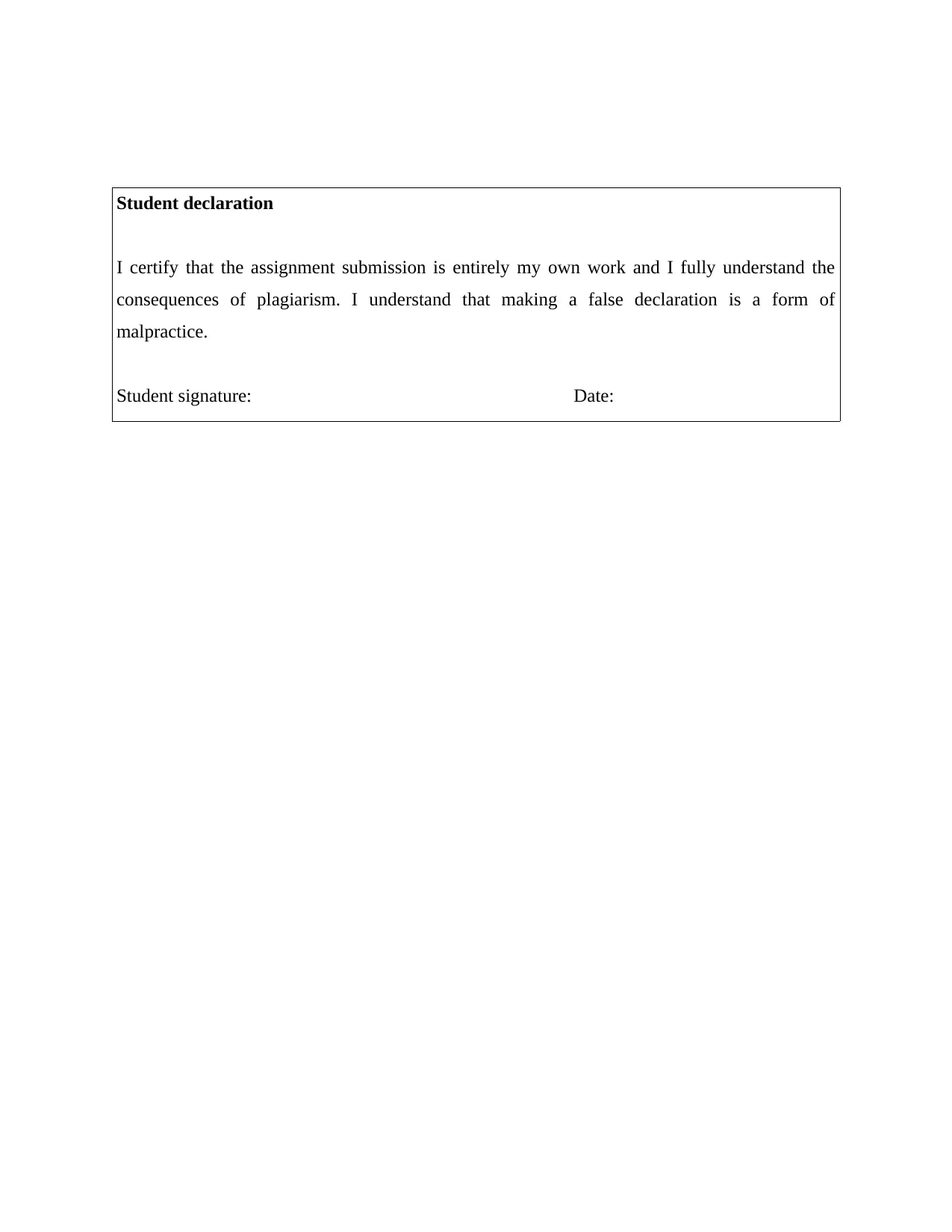
Student declaration
I certify that the assignment submission is entirely my own work and I fully understand the
consequences of plagiarism. I understand that making a false declaration is a form of
malpractice.
Student signature: Date:
I certify that the assignment submission is entirely my own work and I fully understand the
consequences of plagiarism. I understand that making a false declaration is a form of
malpractice.
Student signature: Date:

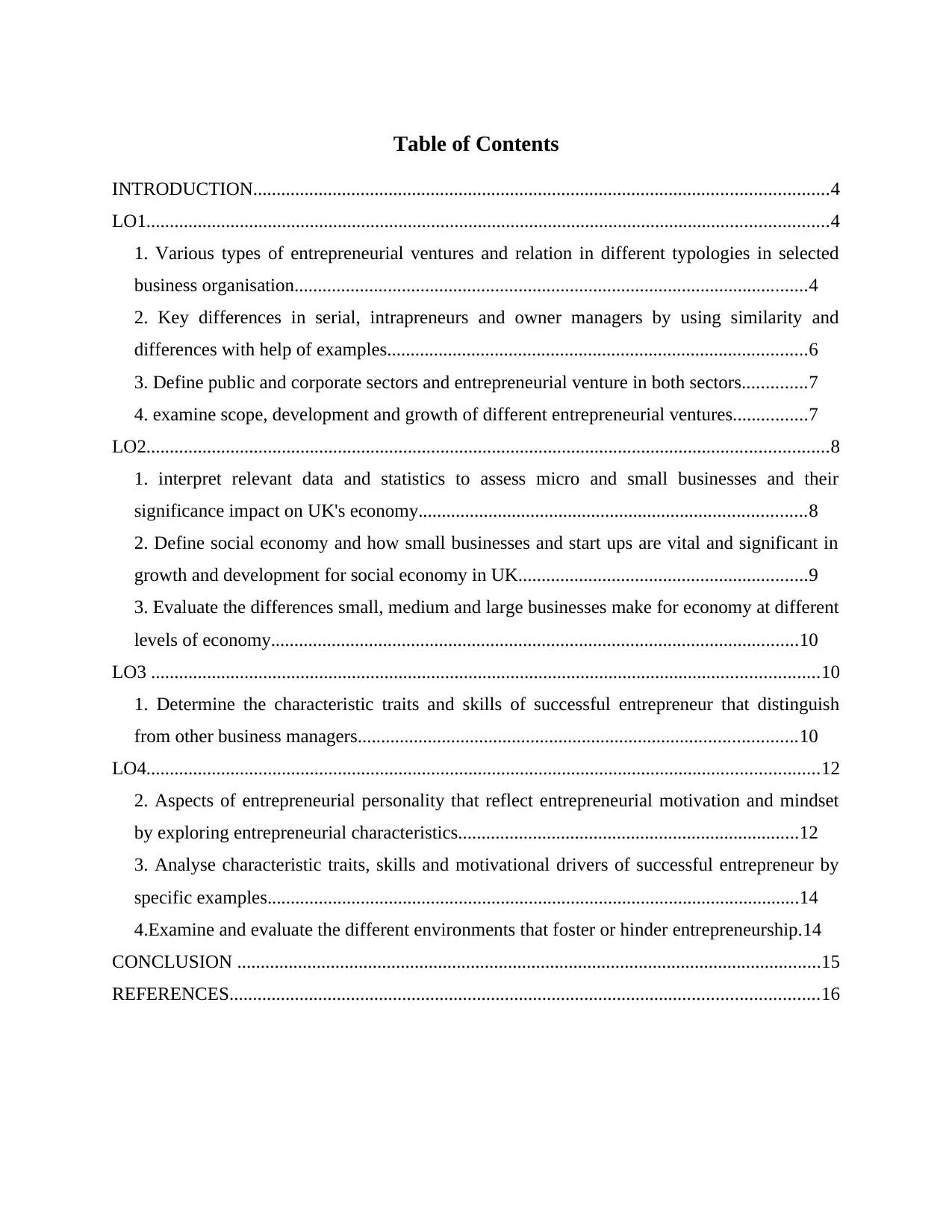
Table of Contents
INTRODUCTION...........................................................................................................................4
LO1..................................................................................................................................................4
1. Various types of entrepreneurial ventures and relation in different typologies in selected
business organisation..............................................................................................................4
2. Key differences in serial, intrapreneurs and owner managers by using similarity and
differences with help of examples..........................................................................................6
3. Define public and corporate sectors and entrepreneurial venture in both sectors..............7
4. examine scope, development and growth of different entrepreneurial ventures................7
LO2..................................................................................................................................................8
1. interpret relevant data and statistics to assess micro and small businesses and their
significance impact on UK's economy...................................................................................8
2. Define social economy and how small businesses and start ups are vital and significant in
growth and development for social economy in UK..............................................................9
3. Evaluate the differences small, medium and large businesses make for economy at different
levels of economy.................................................................................................................10
LO3 ...............................................................................................................................................10
1. Determine the characteristic traits and skills of successful entrepreneur that distinguish
from other business managers..............................................................................................10
LO4................................................................................................................................................12
2. Aspects of entrepreneurial personality that reflect entrepreneurial motivation and mindset
by exploring entrepreneurial characteristics.........................................................................12
3. Analyse characteristic traits, skills and motivational drivers of successful entrepreneur by
specific examples..................................................................................................................14
4.Examine and evaluate the different environments that foster or hinder entrepreneurship.14
CONCLUSION .............................................................................................................................15
REFERENCES..............................................................................................................................16
INTRODUCTION...........................................................................................................................4
LO1..................................................................................................................................................4
1. Various types of entrepreneurial ventures and relation in different typologies in selected
business organisation..............................................................................................................4
2. Key differences in serial, intrapreneurs and owner managers by using similarity and
differences with help of examples..........................................................................................6
3. Define public and corporate sectors and entrepreneurial venture in both sectors..............7
4. examine scope, development and growth of different entrepreneurial ventures................7
LO2..................................................................................................................................................8
1. interpret relevant data and statistics to assess micro and small businesses and their
significance impact on UK's economy...................................................................................8
2. Define social economy and how small businesses and start ups are vital and significant in
growth and development for social economy in UK..............................................................9
3. Evaluate the differences small, medium and large businesses make for economy at different
levels of economy.................................................................................................................10
LO3 ...............................................................................................................................................10
1. Determine the characteristic traits and skills of successful entrepreneur that distinguish
from other business managers..............................................................................................10
LO4................................................................................................................................................12
2. Aspects of entrepreneurial personality that reflect entrepreneurial motivation and mindset
by exploring entrepreneurial characteristics.........................................................................12
3. Analyse characteristic traits, skills and motivational drivers of successful entrepreneur by
specific examples..................................................................................................................14
4.Examine and evaluate the different environments that foster or hinder entrepreneurship.14
CONCLUSION .............................................................................................................................15
REFERENCES..............................................................................................................................16
Secure Best Marks with AI Grader
Need help grading? Try our AI Grader for instant feedback on your assignments.
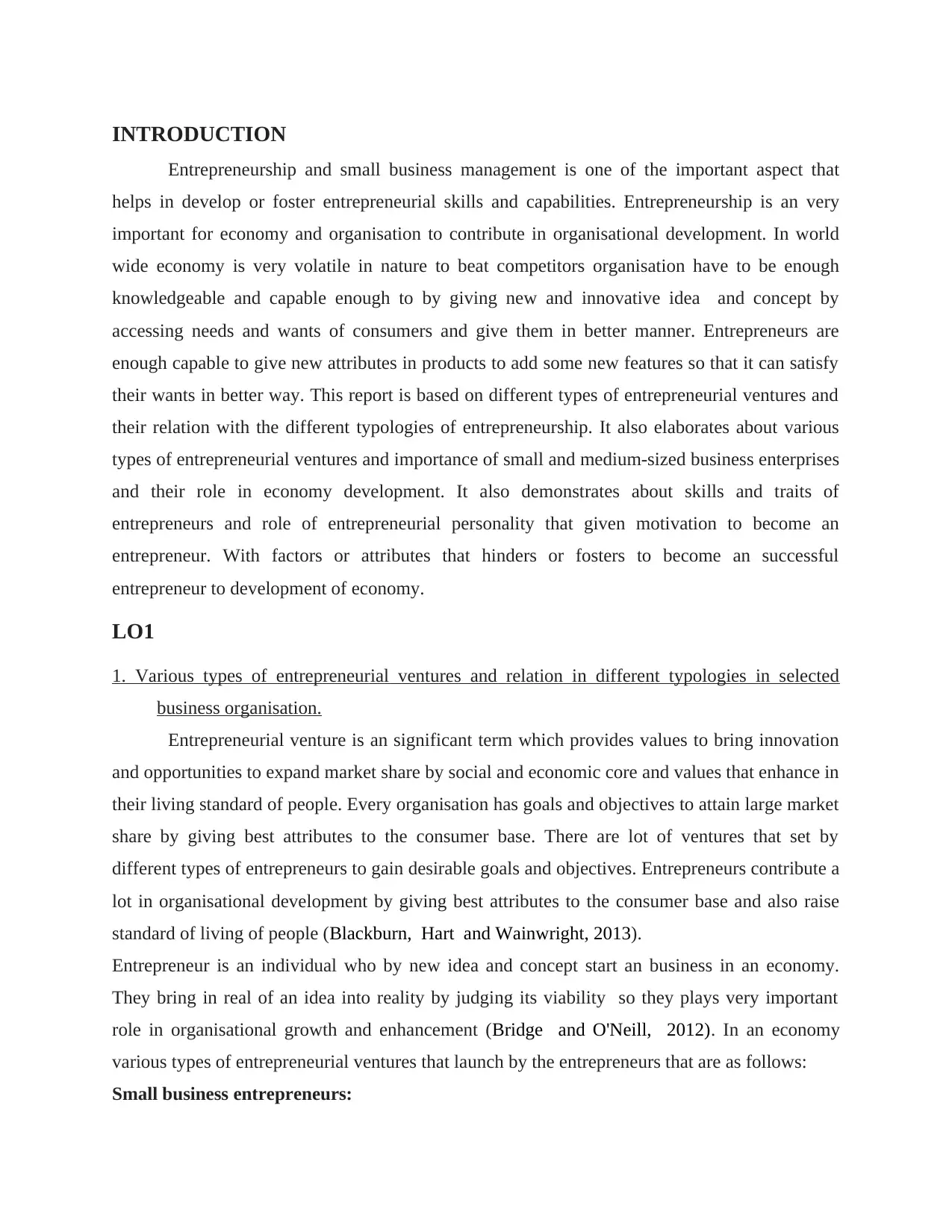
INTRODUCTION
Entrepreneurship and small business management is one of the important aspect that
helps in develop or foster entrepreneurial skills and capabilities. Entrepreneurship is an very
important for economy and organisation to contribute in organisational development. In world
wide economy is very volatile in nature to beat competitors organisation have to be enough
knowledgeable and capable enough to by giving new and innovative idea and concept by
accessing needs and wants of consumers and give them in better manner. Entrepreneurs are
enough capable to give new attributes in products to add some new features so that it can satisfy
their wants in better way. This report is based on different types of entrepreneurial ventures and
their relation with the different typologies of entrepreneurship. It also elaborates about various
types of entrepreneurial ventures and importance of small and medium-sized business enterprises
and their role in economy development. It also demonstrates about skills and traits of
entrepreneurs and role of entrepreneurial personality that given motivation to become an
entrepreneur. With factors or attributes that hinders or fosters to become an successful
entrepreneur to development of economy.
LO1
1. Various types of entrepreneurial ventures and relation in different typologies in selected
business organisation.
Entrepreneurial venture is an significant term which provides values to bring innovation
and opportunities to expand market share by social and economic core and values that enhance in
their living standard of people. Every organisation has goals and objectives to attain large market
share by giving best attributes to the consumer base. There are lot of ventures that set by
different types of entrepreneurs to gain desirable goals and objectives. Entrepreneurs contribute a
lot in organisational development by giving best attributes to the consumer base and also raise
standard of living of people (Blackburn, Hart and Wainwright, 2013).
Entrepreneur is an individual who by new idea and concept start an business in an economy.
They bring in real of an idea into reality by judging its viability so they plays very important
role in organisational growth and enhancement (Bridge and O'Neill, 2012). In an economy
various types of entrepreneurial ventures that launch by the entrepreneurs that are as follows:
Small business entrepreneurs:
Entrepreneurship and small business management is one of the important aspect that
helps in develop or foster entrepreneurial skills and capabilities. Entrepreneurship is an very
important for economy and organisation to contribute in organisational development. In world
wide economy is very volatile in nature to beat competitors organisation have to be enough
knowledgeable and capable enough to by giving new and innovative idea and concept by
accessing needs and wants of consumers and give them in better manner. Entrepreneurs are
enough capable to give new attributes in products to add some new features so that it can satisfy
their wants in better way. This report is based on different types of entrepreneurial ventures and
their relation with the different typologies of entrepreneurship. It also elaborates about various
types of entrepreneurial ventures and importance of small and medium-sized business enterprises
and their role in economy development. It also demonstrates about skills and traits of
entrepreneurs and role of entrepreneurial personality that given motivation to become an
entrepreneur. With factors or attributes that hinders or fosters to become an successful
entrepreneur to development of economy.
LO1
1. Various types of entrepreneurial ventures and relation in different typologies in selected
business organisation.
Entrepreneurial venture is an significant term which provides values to bring innovation
and opportunities to expand market share by social and economic core and values that enhance in
their living standard of people. Every organisation has goals and objectives to attain large market
share by giving best attributes to the consumer base. There are lot of ventures that set by
different types of entrepreneurs to gain desirable goals and objectives. Entrepreneurs contribute a
lot in organisational development by giving best attributes to the consumer base and also raise
standard of living of people (Blackburn, Hart and Wainwright, 2013).
Entrepreneur is an individual who by new idea and concept start an business in an economy.
They bring in real of an idea into reality by judging its viability so they plays very important
role in organisational growth and enhancement (Bridge and O'Neill, 2012). In an economy
various types of entrepreneurial ventures that launch by the entrepreneurs that are as follows:
Small business entrepreneurs:
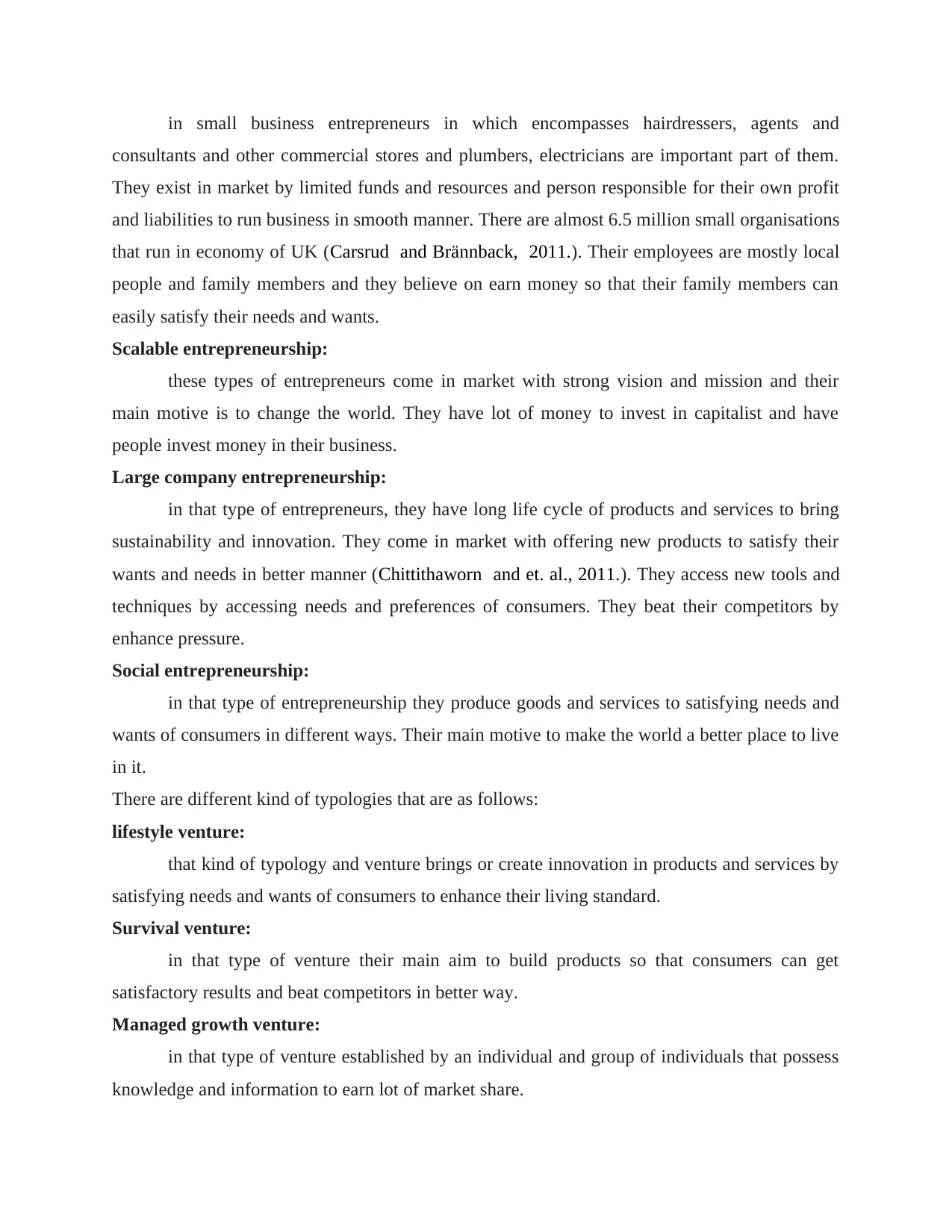
in small business entrepreneurs in which encompasses hairdressers, agents and
consultants and other commercial stores and plumbers, electricians are important part of them.
They exist in market by limited funds and resources and person responsible for their own profit
and liabilities to run business in smooth manner. There are almost 6.5 million small organisations
that run in economy of UK (Carsrud and Brännback, 2011.). Their employees are mostly local
people and family members and they believe on earn money so that their family members can
easily satisfy their needs and wants.
Scalable entrepreneurship:
these types of entrepreneurs come in market with strong vision and mission and their
main motive is to change the world. They have lot of money to invest in capitalist and have
people invest money in their business.
Large company entrepreneurship:
in that type of entrepreneurs, they have long life cycle of products and services to bring
sustainability and innovation. They come in market with offering new products to satisfy their
wants and needs in better manner (Chittithaworn and et. al., 2011.). They access new tools and
techniques by accessing needs and preferences of consumers. They beat their competitors by
enhance pressure.
Social entrepreneurship:
in that type of entrepreneurship they produce goods and services to satisfying needs and
wants of consumers in different ways. Their main motive to make the world a better place to live
in it.
There are different kind of typologies that are as follows:
lifestyle venture:
that kind of typology and venture brings or create innovation in products and services by
satisfying needs and wants of consumers to enhance their living standard.
Survival venture:
in that type of venture their main aim to build products so that consumers can get
satisfactory results and beat competitors in better way.
Managed growth venture:
in that type of venture established by an individual and group of individuals that possess
knowledge and information to earn lot of market share.
consultants and other commercial stores and plumbers, electricians are important part of them.
They exist in market by limited funds and resources and person responsible for their own profit
and liabilities to run business in smooth manner. There are almost 6.5 million small organisations
that run in economy of UK (Carsrud and Brännback, 2011.). Their employees are mostly local
people and family members and they believe on earn money so that their family members can
easily satisfy their needs and wants.
Scalable entrepreneurship:
these types of entrepreneurs come in market with strong vision and mission and their
main motive is to change the world. They have lot of money to invest in capitalist and have
people invest money in their business.
Large company entrepreneurship:
in that type of entrepreneurs, they have long life cycle of products and services to bring
sustainability and innovation. They come in market with offering new products to satisfy their
wants and needs in better manner (Chittithaworn and et. al., 2011.). They access new tools and
techniques by accessing needs and preferences of consumers. They beat their competitors by
enhance pressure.
Social entrepreneurship:
in that type of entrepreneurship they produce goods and services to satisfying needs and
wants of consumers in different ways. Their main motive to make the world a better place to live
in it.
There are different kind of typologies that are as follows:
lifestyle venture:
that kind of typology and venture brings or create innovation in products and services by
satisfying needs and wants of consumers to enhance their living standard.
Survival venture:
in that type of venture their main aim to build products so that consumers can get
satisfactory results and beat competitors in better way.
Managed growth venture:
in that type of venture established by an individual and group of individuals that possess
knowledge and information to earn lot of market share.
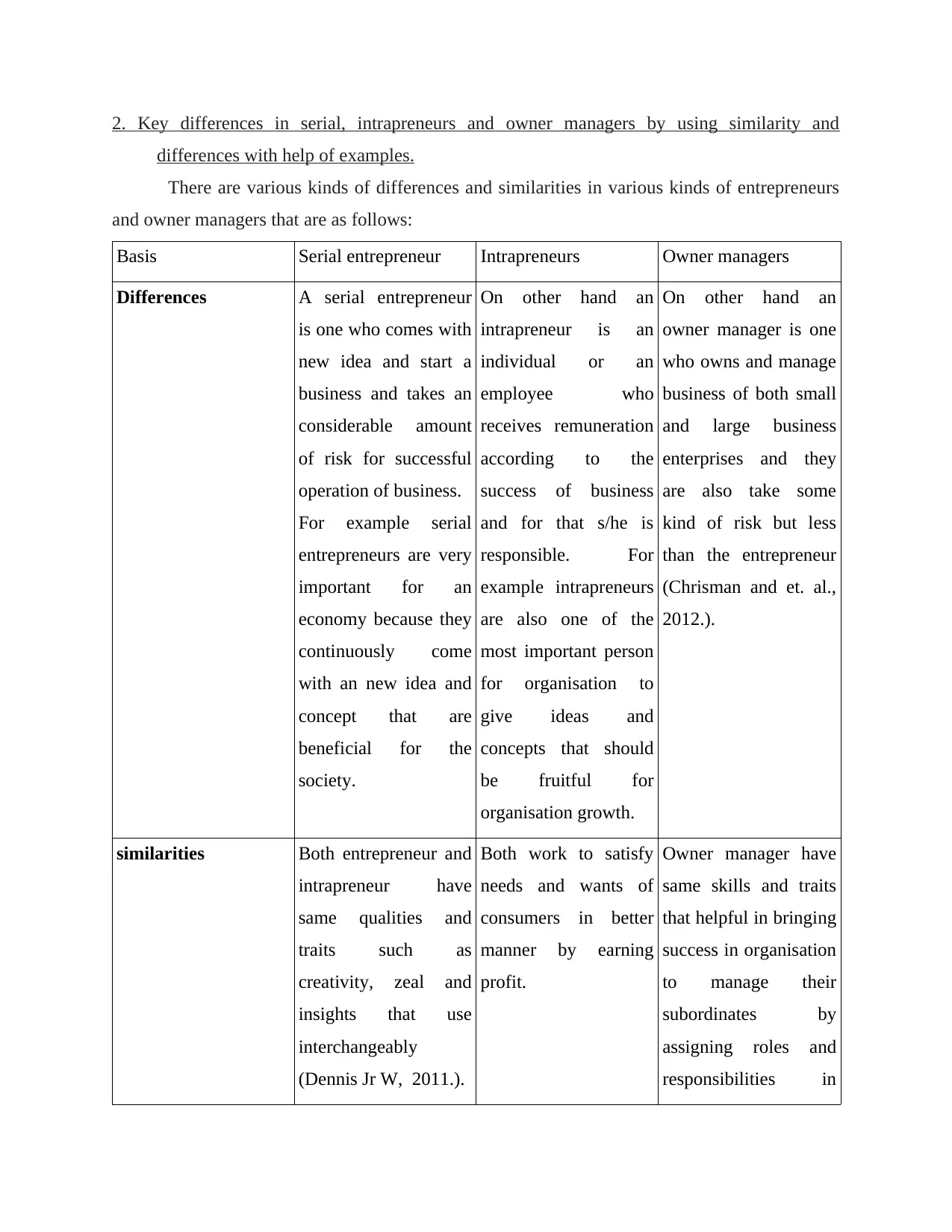
2. Key differences in serial, intrapreneurs and owner managers by using similarity and
differences with help of examples.
There are various kinds of differences and similarities in various kinds of entrepreneurs
and owner managers that are as follows:
Basis Serial entrepreneur Intrapreneurs Owner managers
Differences A serial entrepreneur
is one who comes with
new idea and start a
business and takes an
considerable amount
of risk for successful
operation of business.
For example serial
entrepreneurs are very
important for an
economy because they
continuously come
with an new idea and
concept that are
beneficial for the
society.
On other hand an
intrapreneur is an
individual or an
employee who
receives remuneration
according to the
success of business
and for that s/he is
responsible. For
example intrapreneurs
are also one of the
most important person
for organisation to
give ideas and
concepts that should
be fruitful for
organisation growth.
On other hand an
owner manager is one
who owns and manage
business of both small
and large business
enterprises and they
are also take some
kind of risk but less
than the entrepreneur
(Chrisman and et. al.,
2012.).
similarities Both entrepreneur and
intrapreneur have
same qualities and
traits such as
creativity, zeal and
insights that use
interchangeably
(Dennis Jr W, 2011.).
Both work to satisfy
needs and wants of
consumers in better
manner by earning
profit.
Owner manager have
same skills and traits
that helpful in bringing
success in organisation
to manage their
subordinates by
assigning roles and
responsibilities in
differences with help of examples.
There are various kinds of differences and similarities in various kinds of entrepreneurs
and owner managers that are as follows:
Basis Serial entrepreneur Intrapreneurs Owner managers
Differences A serial entrepreneur
is one who comes with
new idea and start a
business and takes an
considerable amount
of risk for successful
operation of business.
For example serial
entrepreneurs are very
important for an
economy because they
continuously come
with an new idea and
concept that are
beneficial for the
society.
On other hand an
intrapreneur is an
individual or an
employee who
receives remuneration
according to the
success of business
and for that s/he is
responsible. For
example intrapreneurs
are also one of the
most important person
for organisation to
give ideas and
concepts that should
be fruitful for
organisation growth.
On other hand an
owner manager is one
who owns and manage
business of both small
and large business
enterprises and they
are also take some
kind of risk but less
than the entrepreneur
(Chrisman and et. al.,
2012.).
similarities Both entrepreneur and
intrapreneur have
same qualities and
traits such as
creativity, zeal and
insights that use
interchangeably
(Dennis Jr W, 2011.).
Both work to satisfy
needs and wants of
consumers in better
manner by earning
profit.
Owner manager have
same skills and traits
that helpful in bringing
success in organisation
to manage their
subordinates by
assigning roles and
responsibilities in
Paraphrase This Document
Need a fresh take? Get an instant paraphrase of this document with our AI Paraphraser
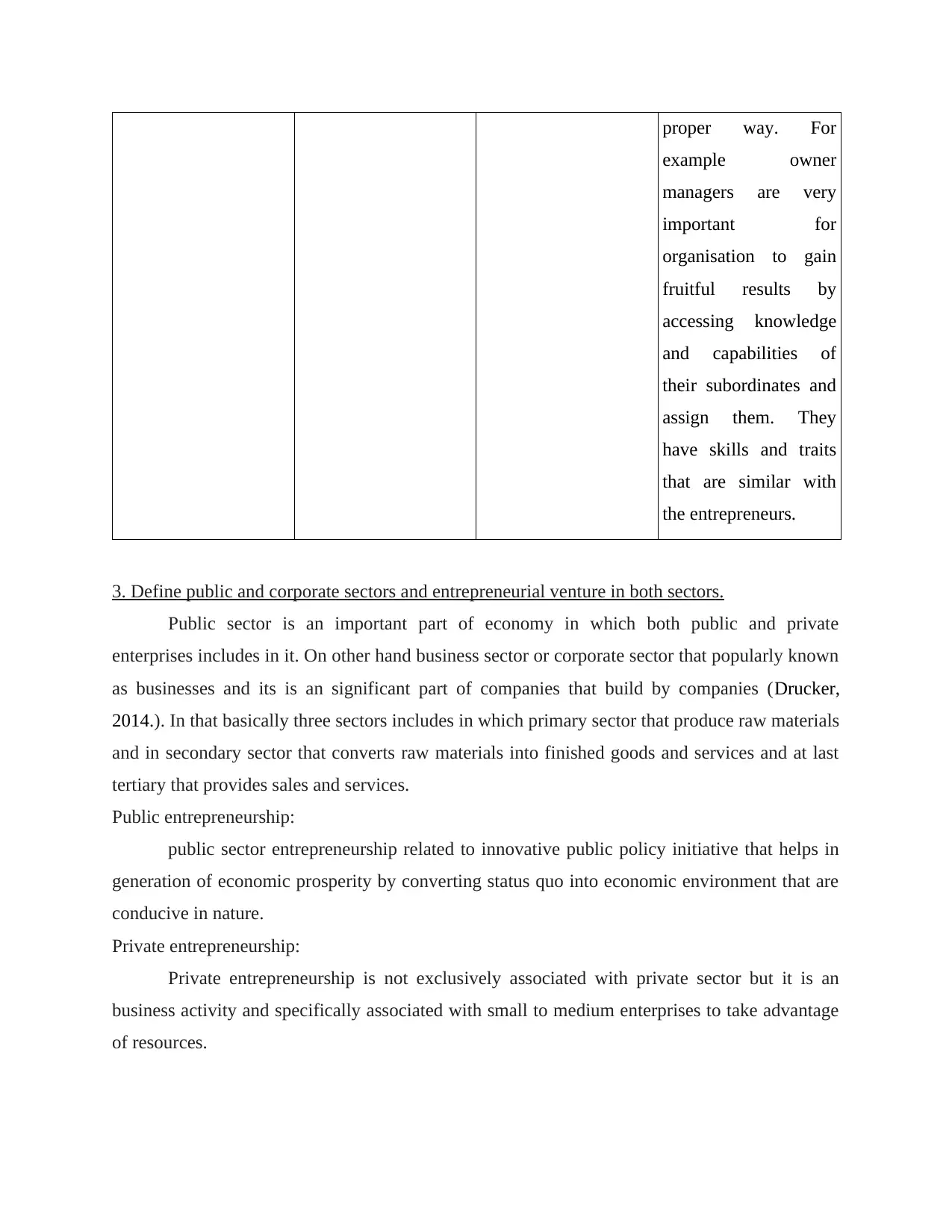
proper way. For
example owner
managers are very
important for
organisation to gain
fruitful results by
accessing knowledge
and capabilities of
their subordinates and
assign them. They
have skills and traits
that are similar with
the entrepreneurs.
3. Define public and corporate sectors and entrepreneurial venture in both sectors.
Public sector is an important part of economy in which both public and private
enterprises includes in it. On other hand business sector or corporate sector that popularly known
as businesses and its is an significant part of companies that build by companies (Drucker,
2014.). In that basically three sectors includes in which primary sector that produce raw materials
and in secondary sector that converts raw materials into finished goods and services and at last
tertiary that provides sales and services.
Public entrepreneurship:
public sector entrepreneurship related to innovative public policy initiative that helps in
generation of economic prosperity by converting status quo into economic environment that are
conducive in nature.
Private entrepreneurship:
Private entrepreneurship is not exclusively associated with private sector but it is an
business activity and specifically associated with small to medium enterprises to take advantage
of resources.
example owner
managers are very
important for
organisation to gain
fruitful results by
accessing knowledge
and capabilities of
their subordinates and
assign them. They
have skills and traits
that are similar with
the entrepreneurs.
3. Define public and corporate sectors and entrepreneurial venture in both sectors.
Public sector is an important part of economy in which both public and private
enterprises includes in it. On other hand business sector or corporate sector that popularly known
as businesses and its is an significant part of companies that build by companies (Drucker,
2014.). In that basically three sectors includes in which primary sector that produce raw materials
and in secondary sector that converts raw materials into finished goods and services and at last
tertiary that provides sales and services.
Public entrepreneurship:
public sector entrepreneurship related to innovative public policy initiative that helps in
generation of economic prosperity by converting status quo into economic environment that are
conducive in nature.
Private entrepreneurship:
Private entrepreneurship is not exclusively associated with private sector but it is an
business activity and specifically associated with small to medium enterprises to take advantage
of resources.
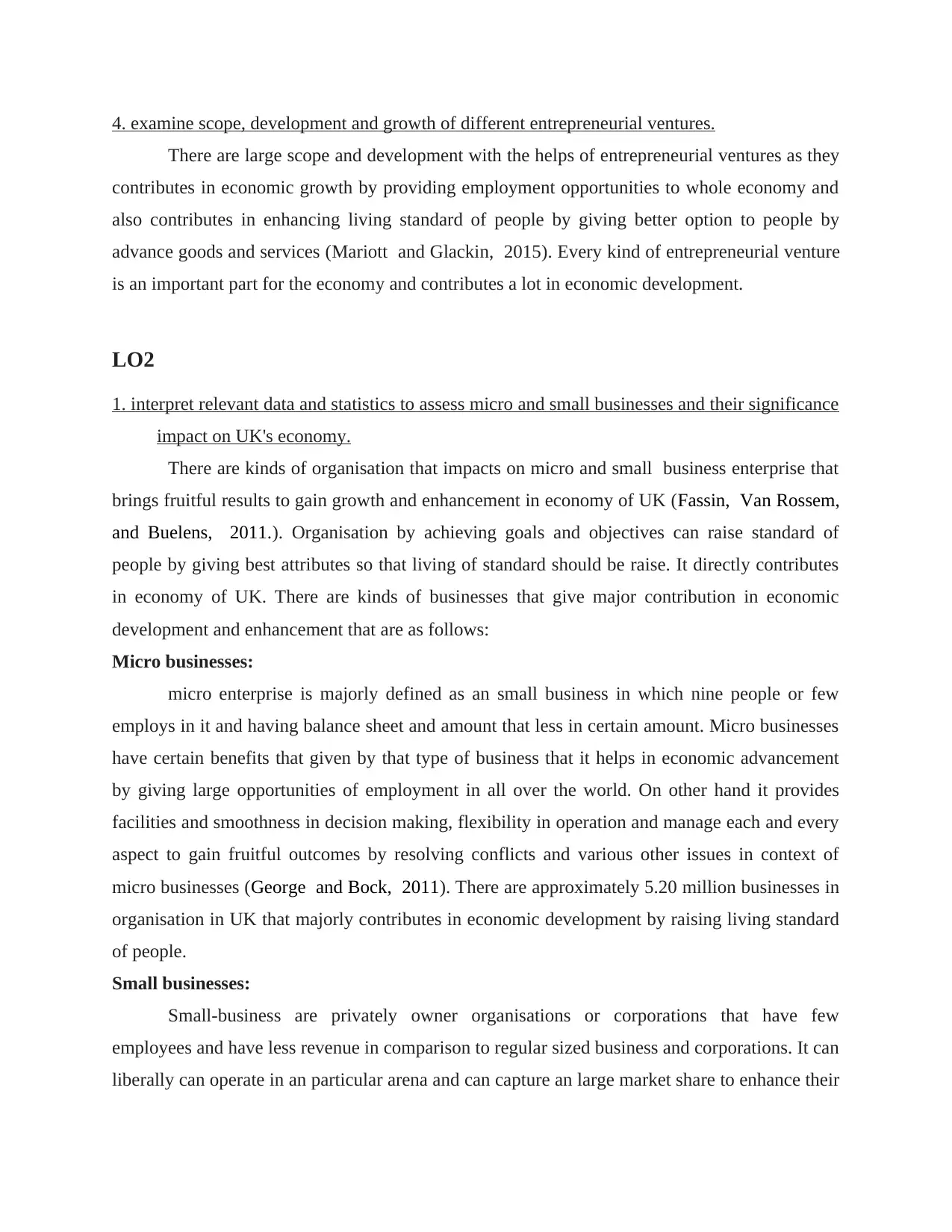
4. examine scope, development and growth of different entrepreneurial ventures.
There are large scope and development with the helps of entrepreneurial ventures as they
contributes in economic growth by providing employment opportunities to whole economy and
also contributes in enhancing living standard of people by giving better option to people by
advance goods and services (Mariott and Glackin, 2015). Every kind of entrepreneurial venture
is an important part for the economy and contributes a lot in economic development.
LO2
1. interpret relevant data and statistics to assess micro and small businesses and their significance
impact on UK's economy.
There are kinds of organisation that impacts on micro and small business enterprise that
brings fruitful results to gain growth and enhancement in economy of UK (Fassin, Van Rossem,
and Buelens, 2011.). Organisation by achieving goals and objectives can raise standard of
people by giving best attributes so that living of standard should be raise. It directly contributes
in economy of UK. There are kinds of businesses that give major contribution in economic
development and enhancement that are as follows:
Micro businesses:
micro enterprise is majorly defined as an small business in which nine people or few
employs in it and having balance sheet and amount that less in certain amount. Micro businesses
have certain benefits that given by that type of business that it helps in economic advancement
by giving large opportunities of employment in all over the world. On other hand it provides
facilities and smoothness in decision making, flexibility in operation and manage each and every
aspect to gain fruitful outcomes by resolving conflicts and various other issues in context of
micro businesses (George and Bock, 2011). There are approximately 5.20 million businesses in
organisation in UK that majorly contributes in economic development by raising living standard
of people.
Small businesses:
Small-business are privately owner organisations or corporations that have few
employees and have less revenue in comparison to regular sized business and corporations. It can
liberally can operate in an particular arena and can capture an large market share to enhance their
There are large scope and development with the helps of entrepreneurial ventures as they
contributes in economic growth by providing employment opportunities to whole economy and
also contributes in enhancing living standard of people by giving better option to people by
advance goods and services (Mariott and Glackin, 2015). Every kind of entrepreneurial venture
is an important part for the economy and contributes a lot in economic development.
LO2
1. interpret relevant data and statistics to assess micro and small businesses and their significance
impact on UK's economy.
There are kinds of organisation that impacts on micro and small business enterprise that
brings fruitful results to gain growth and enhancement in economy of UK (Fassin, Van Rossem,
and Buelens, 2011.). Organisation by achieving goals and objectives can raise standard of
people by giving best attributes so that living of standard should be raise. It directly contributes
in economy of UK. There are kinds of businesses that give major contribution in economic
development and enhancement that are as follows:
Micro businesses:
micro enterprise is majorly defined as an small business in which nine people or few
employs in it and having balance sheet and amount that less in certain amount. Micro businesses
have certain benefits that given by that type of business that it helps in economic advancement
by giving large opportunities of employment in all over the world. On other hand it provides
facilities and smoothness in decision making, flexibility in operation and manage each and every
aspect to gain fruitful outcomes by resolving conflicts and various other issues in context of
micro businesses (George and Bock, 2011). There are approximately 5.20 million businesses in
organisation in UK that majorly contributes in economic development by raising living standard
of people.
Small businesses:
Small-business are privately owner organisations or corporations that have few
employees and have less revenue in comparison to regular sized business and corporations. It can
liberally can operate in an particular arena and can capture an large market share to enhance their
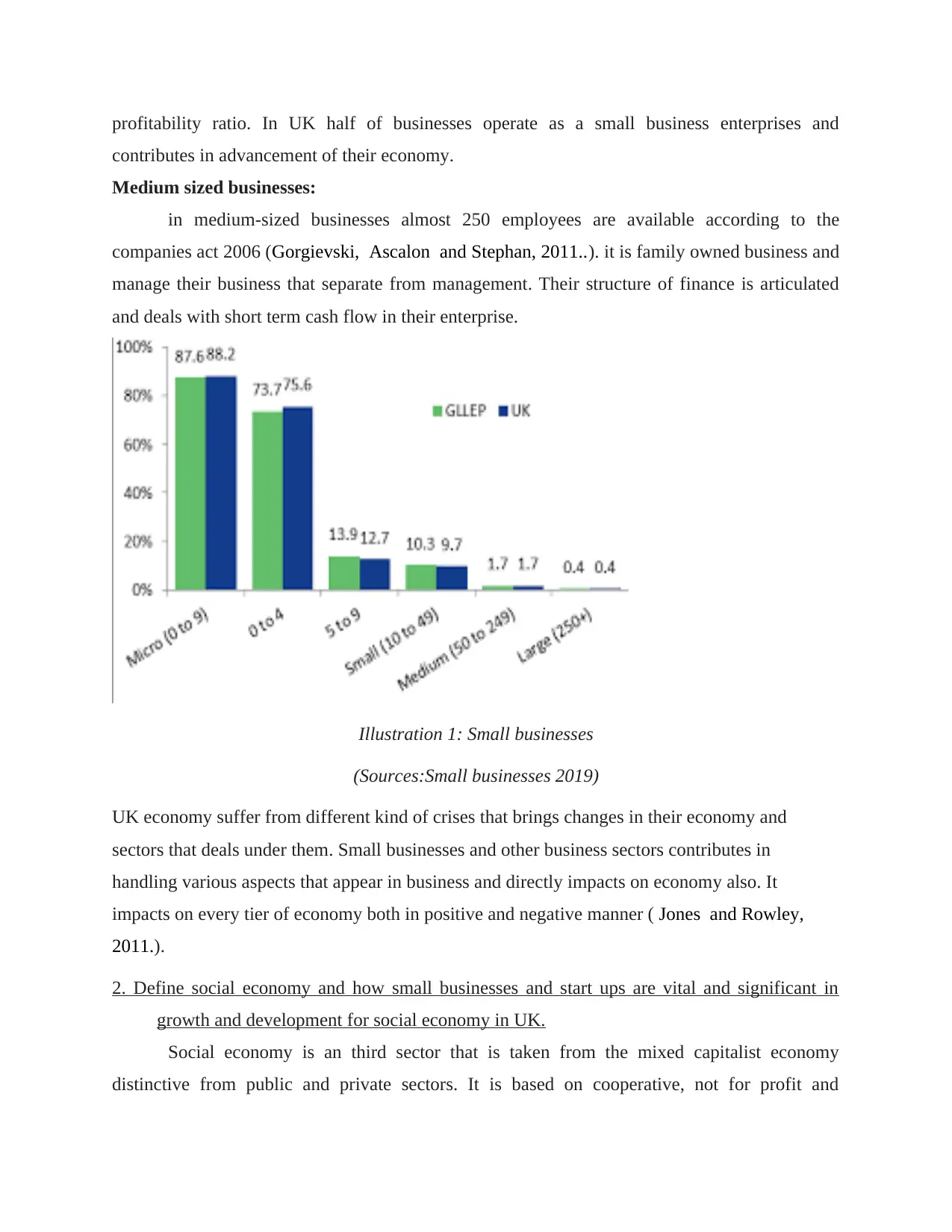
profitability ratio. In UK half of businesses operate as a small business enterprises and
contributes in advancement of their economy.
Medium sized businesses:
in medium-sized businesses almost 250 employees are available according to the
companies act 2006 (Gorgievski, Ascalon and Stephan, 2011..). it is family owned business and
manage their business that separate from management. Their structure of finance is articulated
and deals with short term cash flow in their enterprise.
Illustration 1: Small businesses
(Sources:Small businesses 2019)
UK economy suffer from different kind of crises that brings changes in their economy and
sectors that deals under them. Small businesses and other business sectors contributes in
handling various aspects that appear in business and directly impacts on economy also. It
impacts on every tier of economy both in positive and negative manner ( Jones and Rowley,
2011.).
2. Define social economy and how small businesses and start ups are vital and significant in
growth and development for social economy in UK.
Social economy is an third sector that is taken from the mixed capitalist economy
distinctive from public and private sectors. It is based on cooperative, not for profit and
contributes in advancement of their economy.
Medium sized businesses:
in medium-sized businesses almost 250 employees are available according to the
companies act 2006 (Gorgievski, Ascalon and Stephan, 2011..). it is family owned business and
manage their business that separate from management. Their structure of finance is articulated
and deals with short term cash flow in their enterprise.
Illustration 1: Small businesses
(Sources:Small businesses 2019)
UK economy suffer from different kind of crises that brings changes in their economy and
sectors that deals under them. Small businesses and other business sectors contributes in
handling various aspects that appear in business and directly impacts on economy also. It
impacts on every tier of economy both in positive and negative manner ( Jones and Rowley,
2011.).
2. Define social economy and how small businesses and start ups are vital and significant in
growth and development for social economy in UK.
Social economy is an third sector that is taken from the mixed capitalist economy
distinctive from public and private sectors. It is based on cooperative, not for profit and
Secure Best Marks with AI Grader
Need help grading? Try our AI Grader for instant feedback on your assignments.
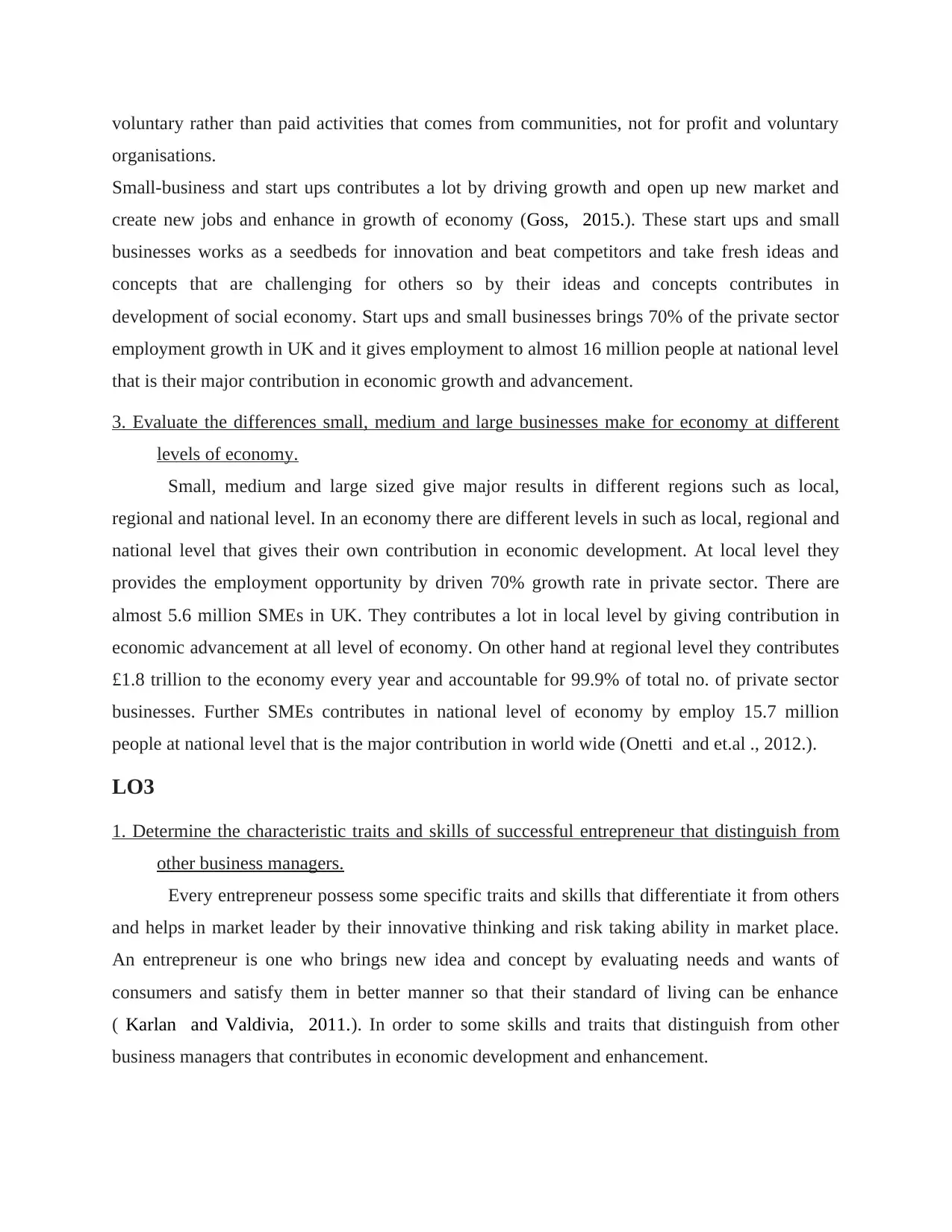
voluntary rather than paid activities that comes from communities, not for profit and voluntary
organisations.
Small-business and start ups contributes a lot by driving growth and open up new market and
create new jobs and enhance in growth of economy (Goss, 2015.). These start ups and small
businesses works as a seedbeds for innovation and beat competitors and take fresh ideas and
concepts that are challenging for others so by their ideas and concepts contributes in
development of social economy. Start ups and small businesses brings 70% of the private sector
employment growth in UK and it gives employment to almost 16 million people at national level
that is their major contribution in economic growth and advancement.
3. Evaluate the differences small, medium and large businesses make for economy at different
levels of economy.
Small, medium and large sized give major results in different regions such as local,
regional and national level. In an economy there are different levels in such as local, regional and
national level that gives their own contribution in economic development. At local level they
provides the employment opportunity by driven 70% growth rate in private sector. There are
almost 5.6 million SMEs in UK. They contributes a lot in local level by giving contribution in
economic advancement at all level of economy. On other hand at regional level they contributes
£1.8 trillion to the economy every year and accountable for 99.9% of total no. of private sector
businesses. Further SMEs contributes in national level of economy by employ 15.7 million
people at national level that is the major contribution in world wide (Onetti and et.al ., 2012.).
LO3
1. Determine the characteristic traits and skills of successful entrepreneur that distinguish from
other business managers.
Every entrepreneur possess some specific traits and skills that differentiate it from others
and helps in market leader by their innovative thinking and risk taking ability in market place.
An entrepreneur is one who brings new idea and concept by evaluating needs and wants of
consumers and satisfy them in better manner so that their standard of living can be enhance
( Karlan and Valdivia, 2011.). In order to some skills and traits that distinguish from other
business managers that contributes in economic development and enhancement.
organisations.
Small-business and start ups contributes a lot by driving growth and open up new market and
create new jobs and enhance in growth of economy (Goss, 2015.). These start ups and small
businesses works as a seedbeds for innovation and beat competitors and take fresh ideas and
concepts that are challenging for others so by their ideas and concepts contributes in
development of social economy. Start ups and small businesses brings 70% of the private sector
employment growth in UK and it gives employment to almost 16 million people at national level
that is their major contribution in economic growth and advancement.
3. Evaluate the differences small, medium and large businesses make for economy at different
levels of economy.
Small, medium and large sized give major results in different regions such as local,
regional and national level. In an economy there are different levels in such as local, regional and
national level that gives their own contribution in economic development. At local level they
provides the employment opportunity by driven 70% growth rate in private sector. There are
almost 5.6 million SMEs in UK. They contributes a lot in local level by giving contribution in
economic advancement at all level of economy. On other hand at regional level they contributes
£1.8 trillion to the economy every year and accountable for 99.9% of total no. of private sector
businesses. Further SMEs contributes in national level of economy by employ 15.7 million
people at national level that is the major contribution in world wide (Onetti and et.al ., 2012.).
LO3
1. Determine the characteristic traits and skills of successful entrepreneur that distinguish from
other business managers.
Every entrepreneur possess some specific traits and skills that differentiate it from others
and helps in market leader by their innovative thinking and risk taking ability in market place.
An entrepreneur is one who brings new idea and concept by evaluating needs and wants of
consumers and satisfy them in better manner so that their standard of living can be enhance
( Karlan and Valdivia, 2011.). In order to some skills and traits that distinguish from other
business managers that contributes in economic development and enhancement.
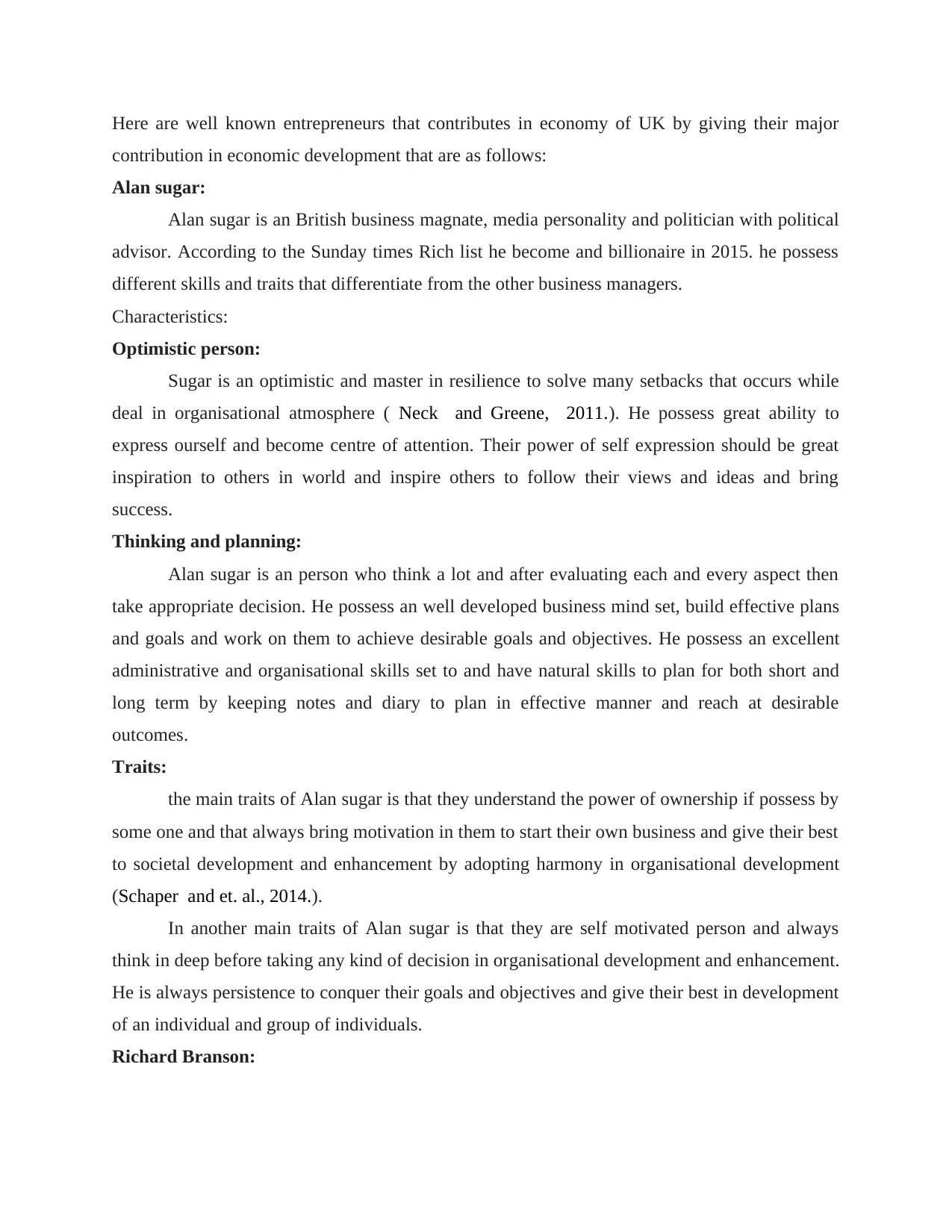
Here are well known entrepreneurs that contributes in economy of UK by giving their major
contribution in economic development that are as follows:
Alan sugar:
Alan sugar is an British business magnate, media personality and politician with political
advisor. According to the Sunday times Rich list he become and billionaire in 2015. he possess
different skills and traits that differentiate from the other business managers.
Characteristics:
Optimistic person:
Sugar is an optimistic and master in resilience to solve many setbacks that occurs while
deal in organisational atmosphere ( Neck and Greene, 2011.). He possess great ability to
express ourself and become centre of attention. Their power of self expression should be great
inspiration to others in world and inspire others to follow their views and ideas and bring
success.
Thinking and planning:
Alan sugar is an person who think a lot and after evaluating each and every aspect then
take appropriate decision. He possess an well developed business mind set, build effective plans
and goals and work on them to achieve desirable goals and objectives. He possess an excellent
administrative and organisational skills set to and have natural skills to plan for both short and
long term by keeping notes and diary to plan in effective manner and reach at desirable
outcomes.
Traits:
the main traits of Alan sugar is that they understand the power of ownership if possess by
some one and that always bring motivation in them to start their own business and give their best
to societal development and enhancement by adopting harmony in organisational development
(Schaper and et. al., 2014.).
In another main traits of Alan sugar is that they are self motivated person and always
think in deep before taking any kind of decision in organisational development and enhancement.
He is always persistence to conquer their goals and objectives and give their best in development
of an individual and group of individuals.
Richard Branson:
contribution in economic development that are as follows:
Alan sugar:
Alan sugar is an British business magnate, media personality and politician with political
advisor. According to the Sunday times Rich list he become and billionaire in 2015. he possess
different skills and traits that differentiate from the other business managers.
Characteristics:
Optimistic person:
Sugar is an optimistic and master in resilience to solve many setbacks that occurs while
deal in organisational atmosphere ( Neck and Greene, 2011.). He possess great ability to
express ourself and become centre of attention. Their power of self expression should be great
inspiration to others in world and inspire others to follow their views and ideas and bring
success.
Thinking and planning:
Alan sugar is an person who think a lot and after evaluating each and every aspect then
take appropriate decision. He possess an well developed business mind set, build effective plans
and goals and work on them to achieve desirable goals and objectives. He possess an excellent
administrative and organisational skills set to and have natural skills to plan for both short and
long term by keeping notes and diary to plan in effective manner and reach at desirable
outcomes.
Traits:
the main traits of Alan sugar is that they understand the power of ownership if possess by
some one and that always bring motivation in them to start their own business and give their best
to societal development and enhancement by adopting harmony in organisational development
(Schaper and et. al., 2014.).
In another main traits of Alan sugar is that they are self motivated person and always
think in deep before taking any kind of decision in organisational development and enhancement.
He is always persistence to conquer their goals and objectives and give their best in development
of an individual and group of individuals.
Richard Branson:
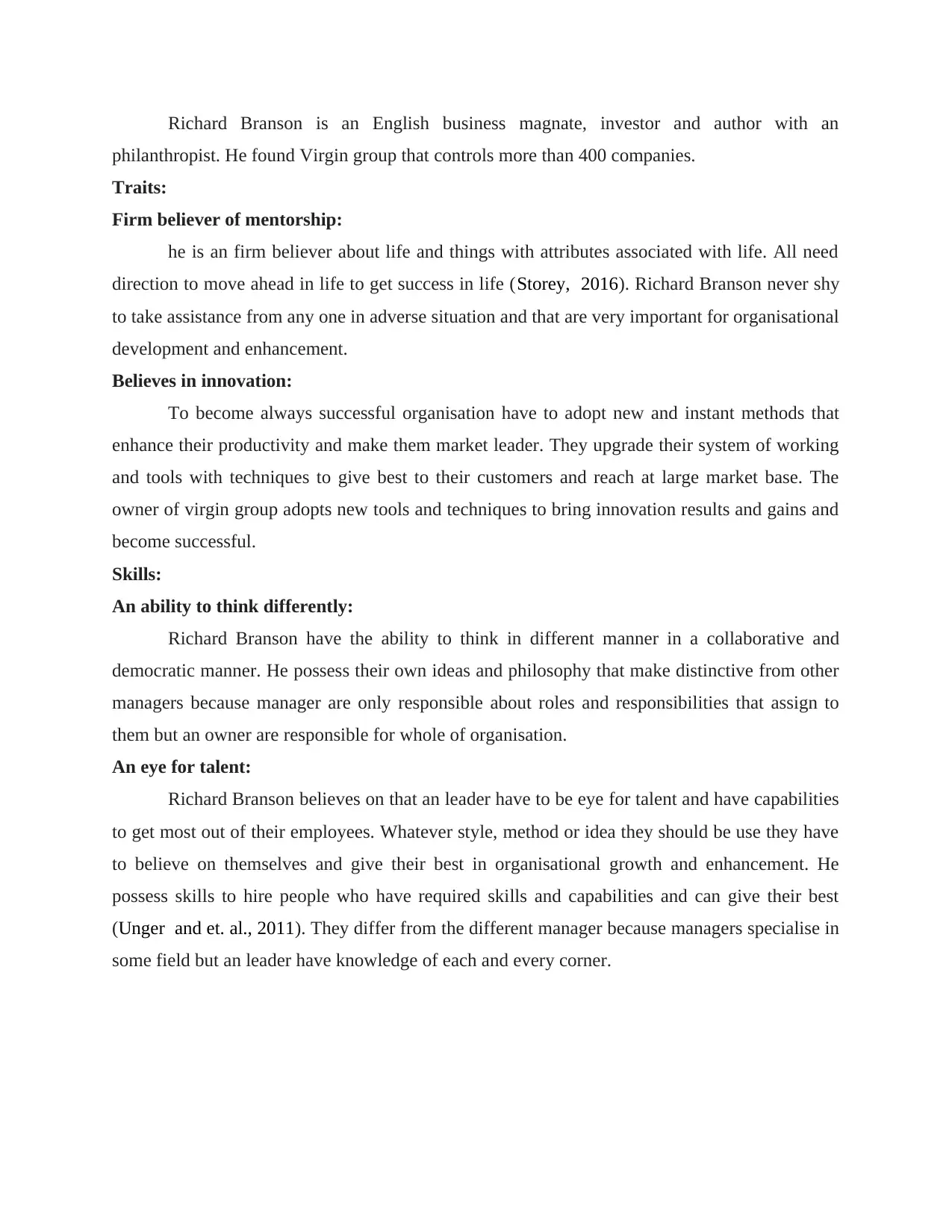
Richard Branson is an English business magnate, investor and author with an
philanthropist. He found Virgin group that controls more than 400 companies.
Traits:
Firm believer of mentorship:
he is an firm believer about life and things with attributes associated with life. All need
direction to move ahead in life to get success in life (Storey, 2016). Richard Branson never shy
to take assistance from any one in adverse situation and that are very important for organisational
development and enhancement.
Believes in innovation:
To become always successful organisation have to adopt new and instant methods that
enhance their productivity and make them market leader. They upgrade their system of working
and tools with techniques to give best to their customers and reach at large market base. The
owner of virgin group adopts new tools and techniques to bring innovation results and gains and
become successful.
Skills:
An ability to think differently:
Richard Branson have the ability to think in different manner in a collaborative and
democratic manner. He possess their own ideas and philosophy that make distinctive from other
managers because manager are only responsible about roles and responsibilities that assign to
them but an owner are responsible for whole of organisation.
An eye for talent:
Richard Branson believes on that an leader have to be eye for talent and have capabilities
to get most out of their employees. Whatever style, method or idea they should be use they have
to believe on themselves and give their best in organisational growth and enhancement. He
possess skills to hire people who have required skills and capabilities and can give their best
(Unger and et. al., 2011). They differ from the different manager because managers specialise in
some field but an leader have knowledge of each and every corner.
philanthropist. He found Virgin group that controls more than 400 companies.
Traits:
Firm believer of mentorship:
he is an firm believer about life and things with attributes associated with life. All need
direction to move ahead in life to get success in life (Storey, 2016). Richard Branson never shy
to take assistance from any one in adverse situation and that are very important for organisational
development and enhancement.
Believes in innovation:
To become always successful organisation have to adopt new and instant methods that
enhance their productivity and make them market leader. They upgrade their system of working
and tools with techniques to give best to their customers and reach at large market base. The
owner of virgin group adopts new tools and techniques to bring innovation results and gains and
become successful.
Skills:
An ability to think differently:
Richard Branson have the ability to think in different manner in a collaborative and
democratic manner. He possess their own ideas and philosophy that make distinctive from other
managers because manager are only responsible about roles and responsibilities that assign to
them but an owner are responsible for whole of organisation.
An eye for talent:
Richard Branson believes on that an leader have to be eye for talent and have capabilities
to get most out of their employees. Whatever style, method or idea they should be use they have
to believe on themselves and give their best in organisational growth and enhancement. He
possess skills to hire people who have required skills and capabilities and can give their best
(Unger and et. al., 2011). They differ from the different manager because managers specialise in
some field but an leader have knowledge of each and every corner.
Paraphrase This Document
Need a fresh take? Get an instant paraphrase of this document with our AI Paraphraser
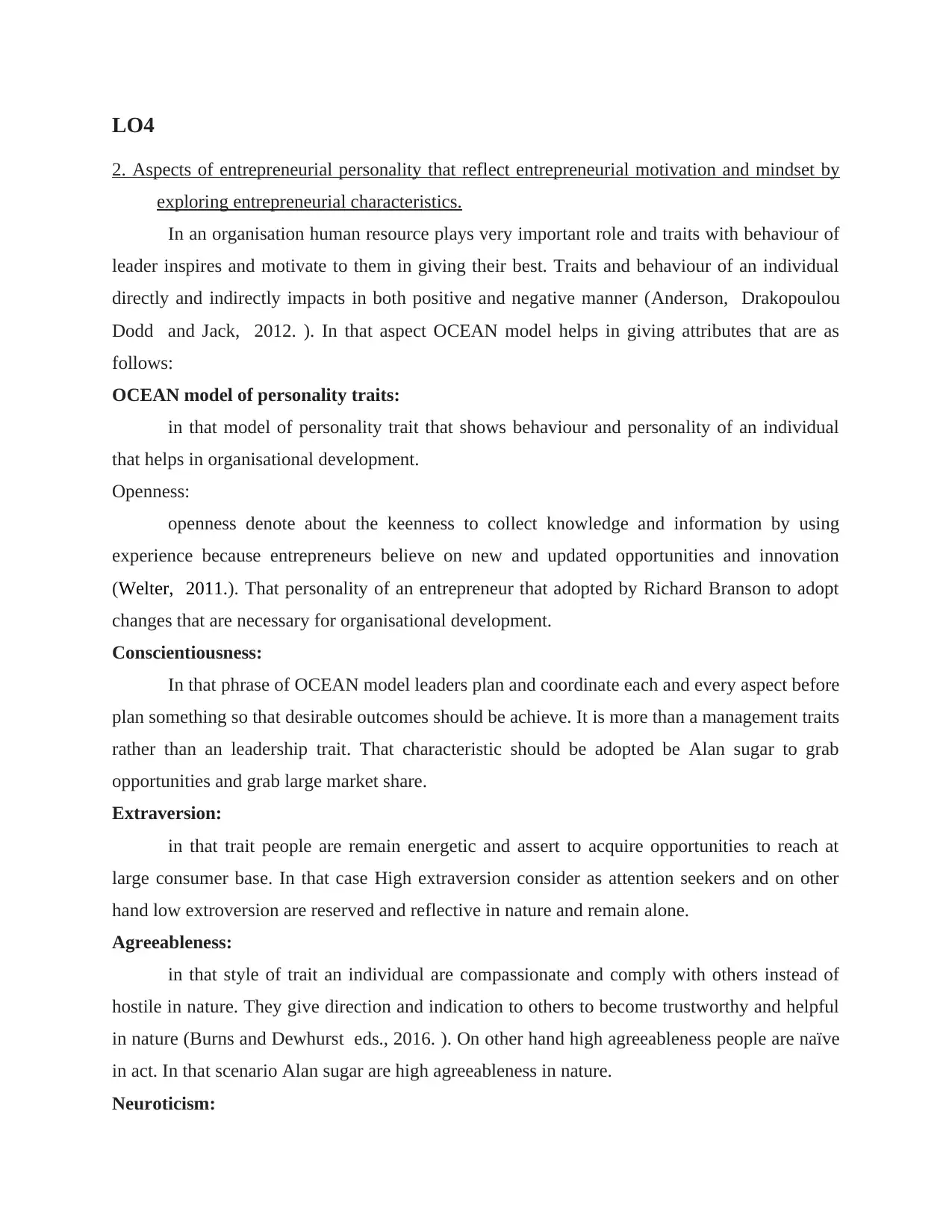
LO4
2. Aspects of entrepreneurial personality that reflect entrepreneurial motivation and mindset by
exploring entrepreneurial characteristics.
In an organisation human resource plays very important role and traits with behaviour of
leader inspires and motivate to them in giving their best. Traits and behaviour of an individual
directly and indirectly impacts in both positive and negative manner (Anderson, Drakopoulou
Dodd and Jack, 2012. ). In that aspect OCEAN model helps in giving attributes that are as
follows:
OCEAN model of personality traits:
in that model of personality trait that shows behaviour and personality of an individual
that helps in organisational development.
Openness:
openness denote about the keenness to collect knowledge and information by using
experience because entrepreneurs believe on new and updated opportunities and innovation
(Welter, 2011.). That personality of an entrepreneur that adopted by Richard Branson to adopt
changes that are necessary for organisational development.
Conscientiousness:
In that phrase of OCEAN model leaders plan and coordinate each and every aspect before
plan something so that desirable outcomes should be achieve. It is more than a management traits
rather than an leadership trait. That characteristic should be adopted be Alan sugar to grab
opportunities and grab large market share.
Extraversion:
in that trait people are remain energetic and assert to acquire opportunities to reach at
large consumer base. In that case High extraversion consider as attention seekers and on other
hand low extroversion are reserved and reflective in nature and remain alone.
Agreeableness:
in that style of trait an individual are compassionate and comply with others instead of
hostile in nature. They give direction and indication to others to become trustworthy and helpful
in nature (Burns and Dewhurst eds., 2016. ). On other hand high agreeableness people are naïve
in act. In that scenario Alan sugar are high agreeableness in nature.
Neuroticism:
2. Aspects of entrepreneurial personality that reflect entrepreneurial motivation and mindset by
exploring entrepreneurial characteristics.
In an organisation human resource plays very important role and traits with behaviour of
leader inspires and motivate to them in giving their best. Traits and behaviour of an individual
directly and indirectly impacts in both positive and negative manner (Anderson, Drakopoulou
Dodd and Jack, 2012. ). In that aspect OCEAN model helps in giving attributes that are as
follows:
OCEAN model of personality traits:
in that model of personality trait that shows behaviour and personality of an individual
that helps in organisational development.
Openness:
openness denote about the keenness to collect knowledge and information by using
experience because entrepreneurs believe on new and updated opportunities and innovation
(Welter, 2011.). That personality of an entrepreneur that adopted by Richard Branson to adopt
changes that are necessary for organisational development.
Conscientiousness:
In that phrase of OCEAN model leaders plan and coordinate each and every aspect before
plan something so that desirable outcomes should be achieve. It is more than a management traits
rather than an leadership trait. That characteristic should be adopted be Alan sugar to grab
opportunities and grab large market share.
Extraversion:
in that trait people are remain energetic and assert to acquire opportunities to reach at
large consumer base. In that case High extraversion consider as attention seekers and on other
hand low extroversion are reserved and reflective in nature and remain alone.
Agreeableness:
in that style of trait an individual are compassionate and comply with others instead of
hostile in nature. They give direction and indication to others to become trustworthy and helpful
in nature (Burns and Dewhurst eds., 2016. ). On other hand high agreeableness people are naïve
in act. In that scenario Alan sugar are high agreeableness in nature.
Neuroticism:
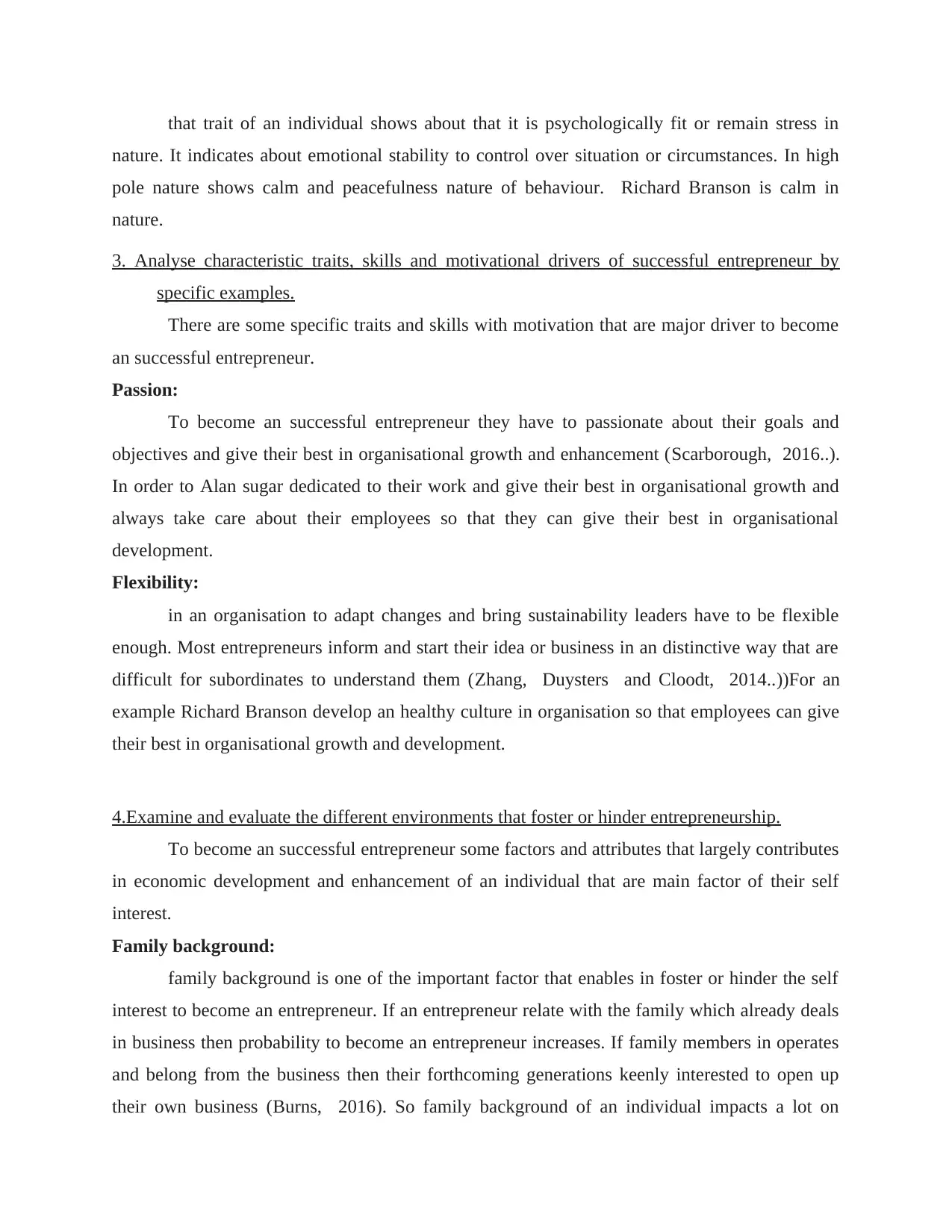
that trait of an individual shows about that it is psychologically fit or remain stress in
nature. It indicates about emotional stability to control over situation or circumstances. In high
pole nature shows calm and peacefulness nature of behaviour. Richard Branson is calm in
nature.
3. Analyse characteristic traits, skills and motivational drivers of successful entrepreneur by
specific examples.
There are some specific traits and skills with motivation that are major driver to become
an successful entrepreneur.
Passion:
To become an successful entrepreneur they have to passionate about their goals and
objectives and give their best in organisational growth and enhancement (Scarborough, 2016..).
In order to Alan sugar dedicated to their work and give their best in organisational growth and
always take care about their employees so that they can give their best in organisational
development.
Flexibility:
in an organisation to adapt changes and bring sustainability leaders have to be flexible
enough. Most entrepreneurs inform and start their idea or business in an distinctive way that are
difficult for subordinates to understand them (Zhang, Duysters and Cloodt, 2014..))For an
example Richard Branson develop an healthy culture in organisation so that employees can give
their best in organisational growth and development.
4.Examine and evaluate the different environments that foster or hinder entrepreneurship.
To become an successful entrepreneur some factors and attributes that largely contributes
in economic development and enhancement of an individual that are main factor of their self
interest.
Family background:
family background is one of the important factor that enables in foster or hinder the self
interest to become an entrepreneur. If an entrepreneur relate with the family which already deals
in business then probability to become an entrepreneur increases. If family members in operates
and belong from the business then their forthcoming generations keenly interested to open up
their own business (Burns, 2016). So family background of an individual impacts a lot on
nature. It indicates about emotional stability to control over situation or circumstances. In high
pole nature shows calm and peacefulness nature of behaviour. Richard Branson is calm in
nature.
3. Analyse characteristic traits, skills and motivational drivers of successful entrepreneur by
specific examples.
There are some specific traits and skills with motivation that are major driver to become
an successful entrepreneur.
Passion:
To become an successful entrepreneur they have to passionate about their goals and
objectives and give their best in organisational growth and enhancement (Scarborough, 2016..).
In order to Alan sugar dedicated to their work and give their best in organisational growth and
always take care about their employees so that they can give their best in organisational
development.
Flexibility:
in an organisation to adapt changes and bring sustainability leaders have to be flexible
enough. Most entrepreneurs inform and start their idea or business in an distinctive way that are
difficult for subordinates to understand them (Zhang, Duysters and Cloodt, 2014..))For an
example Richard Branson develop an healthy culture in organisation so that employees can give
their best in organisational growth and development.
4.Examine and evaluate the different environments that foster or hinder entrepreneurship.
To become an successful entrepreneur some factors and attributes that largely contributes
in economic development and enhancement of an individual that are main factor of their self
interest.
Family background:
family background is one of the important factor that enables in foster or hinder the self
interest to become an entrepreneur. If an entrepreneur relate with the family which already deals
in business then probability to become an entrepreneur increases. If family members in operates
and belong from the business then their forthcoming generations keenly interested to open up
their own business (Burns, 2016). So family background of an individual impacts a lot on
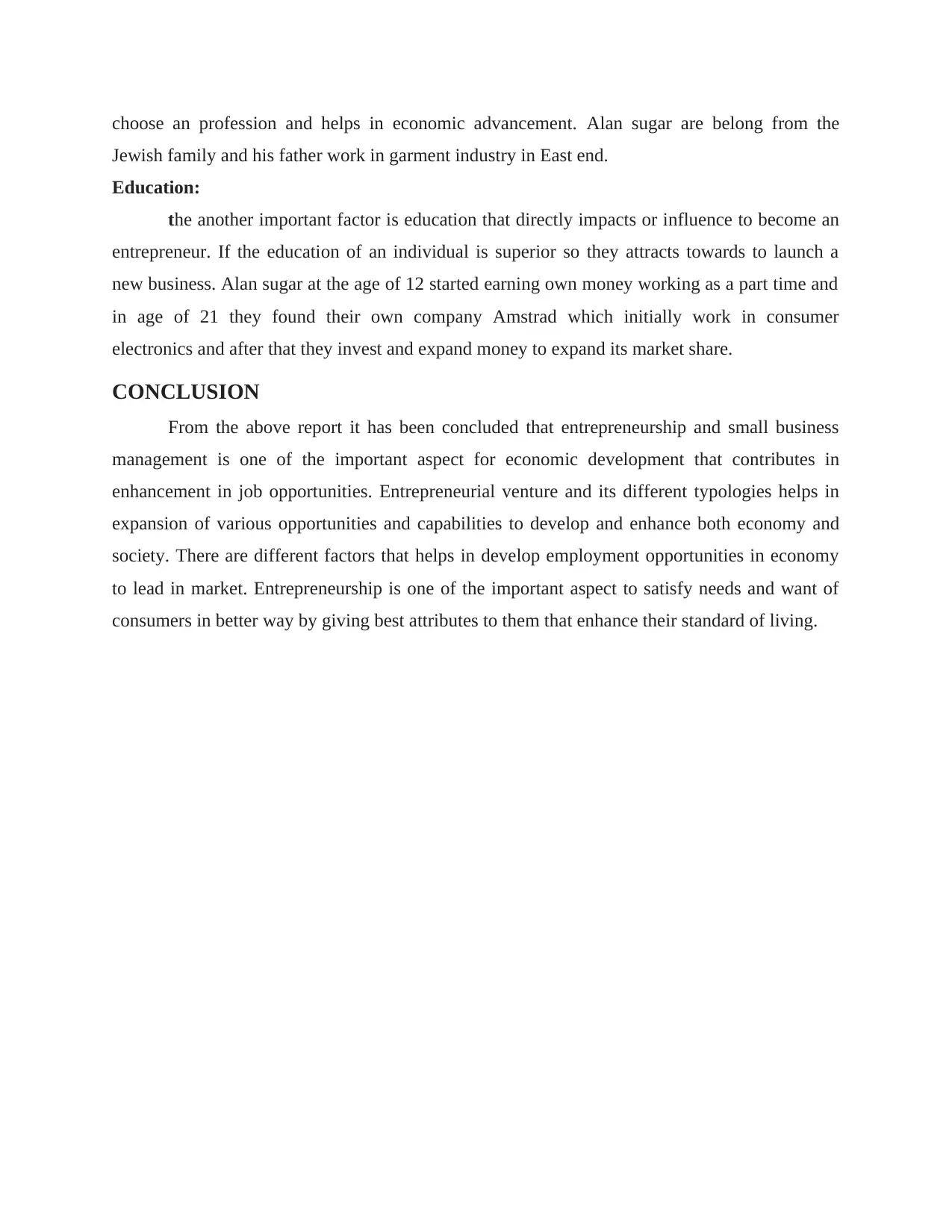
choose an profession and helps in economic advancement. Alan sugar are belong from the
Jewish family and his father work in garment industry in East end.
Education:
the another important factor is education that directly impacts or influence to become an
entrepreneur. If the education of an individual is superior so they attracts towards to launch a
new business. Alan sugar at the age of 12 started earning own money working as a part time and
in age of 21 they found their own company Amstrad which initially work in consumer
electronics and after that they invest and expand money to expand its market share.
CONCLUSION
From the above report it has been concluded that entrepreneurship and small business
management is one of the important aspect for economic development that contributes in
enhancement in job opportunities. Entrepreneurial venture and its different typologies helps in
expansion of various opportunities and capabilities to develop and enhance both economy and
society. There are different factors that helps in develop employment opportunities in economy
to lead in market. Entrepreneurship is one of the important aspect to satisfy needs and want of
consumers in better way by giving best attributes to them that enhance their standard of living.
Jewish family and his father work in garment industry in East end.
Education:
the another important factor is education that directly impacts or influence to become an
entrepreneur. If the education of an individual is superior so they attracts towards to launch a
new business. Alan sugar at the age of 12 started earning own money working as a part time and
in age of 21 they found their own company Amstrad which initially work in consumer
electronics and after that they invest and expand money to expand its market share.
CONCLUSION
From the above report it has been concluded that entrepreneurship and small business
management is one of the important aspect for economic development that contributes in
enhancement in job opportunities. Entrepreneurial venture and its different typologies helps in
expansion of various opportunities and capabilities to develop and enhance both economy and
society. There are different factors that helps in develop employment opportunities in economy
to lead in market. Entrepreneurship is one of the important aspect to satisfy needs and want of
consumers in better way by giving best attributes to them that enhance their standard of living.
Secure Best Marks with AI Grader
Need help grading? Try our AI Grader for instant feedback on your assignments.
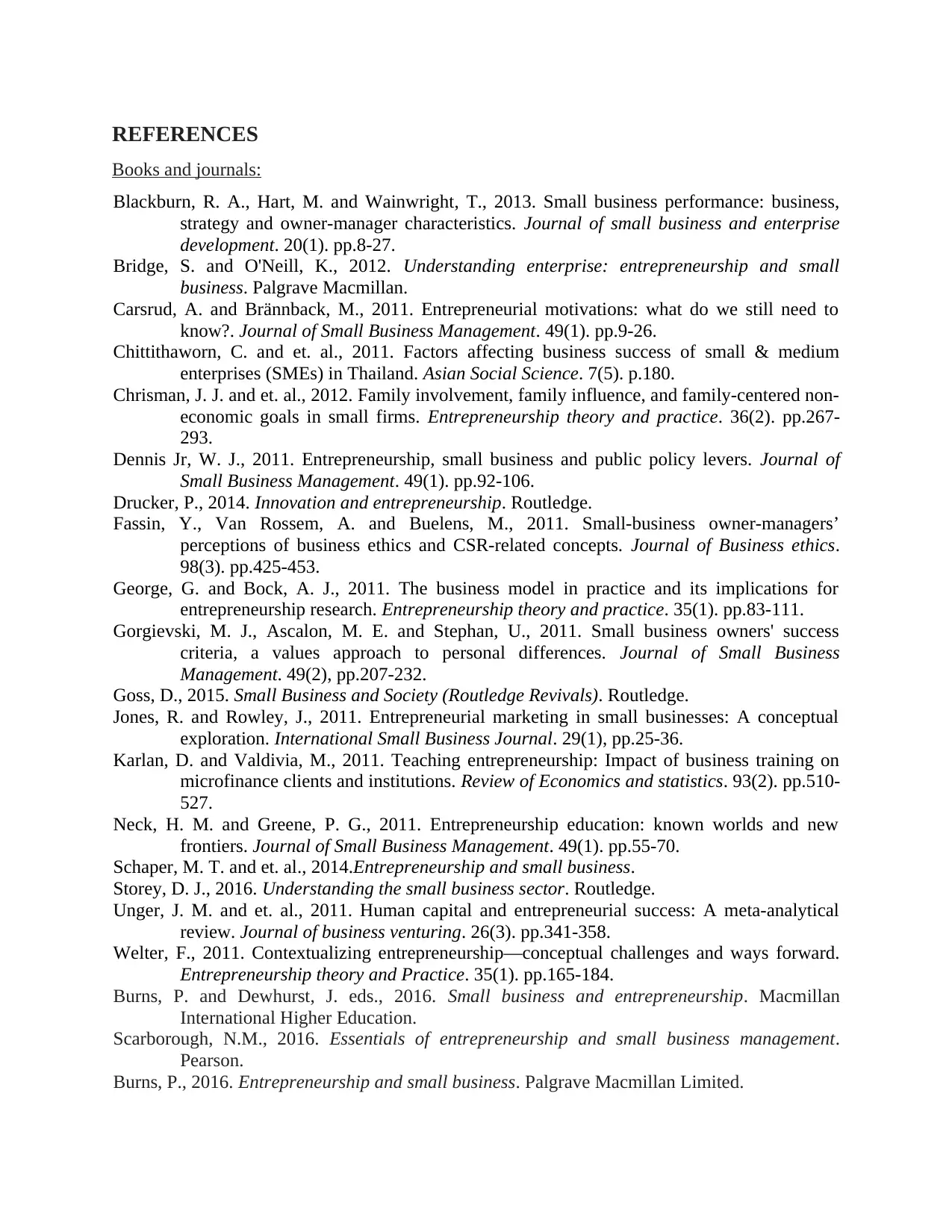
REFERENCES
Books and journals:
Blackburn, R. A., Hart, M. and Wainwright, T., 2013. Small business performance: business,
strategy and owner-manager characteristics. Journal of small business and enterprise
development. 20(1). pp.8-27.
Bridge, S. and O'Neill, K., 2012. Understanding enterprise: entrepreneurship and small
business. Palgrave Macmillan.
Carsrud, A. and Brännback, M., 2011. Entrepreneurial motivations: what do we still need to
know?. Journal of Small Business Management. 49(1). pp.9-26.
Chittithaworn, C. and et. al., 2011. Factors affecting business success of small & medium
enterprises (SMEs) in Thailand. Asian Social Science. 7(5). p.180.
Chrisman, J. J. and et. al., 2012. Family involvement, family influence, and family‐centered non‐
economic goals in small firms. Entrepreneurship theory and practice. 36(2). pp.267-
293.
Dennis Jr, W. J., 2011. Entrepreneurship, small business and public policy levers. Journal of
Small Business Management. 49(1). pp.92-106.
Drucker, P., 2014. Innovation and entrepreneurship. Routledge.
Fassin, Y., Van Rossem, A. and Buelens, M., 2011. Small-business owner-managers’
perceptions of business ethics and CSR-related concepts. Journal of Business ethics.
98(3). pp.425-453.
George, G. and Bock, A. J., 2011. The business model in practice and its implications for
entrepreneurship research. Entrepreneurship theory and practice. 35(1). pp.83-111.
Gorgievski, M. J., Ascalon, M. E. and Stephan, U., 2011. Small business owners' success
criteria, a values approach to personal differences. Journal of Small Business
Management. 49(2), pp.207-232.
Goss, D., 2015. Small Business and Society (Routledge Revivals). Routledge.
Jones, R. and Rowley, J., 2011. Entrepreneurial marketing in small businesses: A conceptual
exploration. International Small Business Journal. 29(1), pp.25-36.
Karlan, D. and Valdivia, M., 2011. Teaching entrepreneurship: Impact of business training on
microfinance clients and institutions. Review of Economics and statistics. 93(2). pp.510-
527.
Neck, H. M. and Greene, P. G., 2011. Entrepreneurship education: known worlds and new
frontiers. Journal of Small Business Management. 49(1). pp.55-70.
Schaper, M. T. and et. al., 2014.Entrepreneurship and small business.
Storey, D. J., 2016. Understanding the small business sector. Routledge.
Unger, J. M. and et. al., 2011. Human capital and entrepreneurial success: A meta-analytical
review. Journal of business venturing. 26(3). pp.341-358.
Welter, F., 2011. Contextualizing entrepreneurship—conceptual challenges and ways forward.
Entrepreneurship theory and Practice. 35(1). pp.165-184.
Burns, P. and Dewhurst, J. eds., 2016. Small business and entrepreneurship. Macmillan
International Higher Education.
Scarborough, N.M., 2016. Essentials of entrepreneurship and small business management.
Pearson.
Burns, P., 2016. Entrepreneurship and small business. Palgrave Macmillan Limited.
Books and journals:
Blackburn, R. A., Hart, M. and Wainwright, T., 2013. Small business performance: business,
strategy and owner-manager characteristics. Journal of small business and enterprise
development. 20(1). pp.8-27.
Bridge, S. and O'Neill, K., 2012. Understanding enterprise: entrepreneurship and small
business. Palgrave Macmillan.
Carsrud, A. and Brännback, M., 2011. Entrepreneurial motivations: what do we still need to
know?. Journal of Small Business Management. 49(1). pp.9-26.
Chittithaworn, C. and et. al., 2011. Factors affecting business success of small & medium
enterprises (SMEs) in Thailand. Asian Social Science. 7(5). p.180.
Chrisman, J. J. and et. al., 2012. Family involvement, family influence, and family‐centered non‐
economic goals in small firms. Entrepreneurship theory and practice. 36(2). pp.267-
293.
Dennis Jr, W. J., 2011. Entrepreneurship, small business and public policy levers. Journal of
Small Business Management. 49(1). pp.92-106.
Drucker, P., 2014. Innovation and entrepreneurship. Routledge.
Fassin, Y., Van Rossem, A. and Buelens, M., 2011. Small-business owner-managers’
perceptions of business ethics and CSR-related concepts. Journal of Business ethics.
98(3). pp.425-453.
George, G. and Bock, A. J., 2011. The business model in practice and its implications for
entrepreneurship research. Entrepreneurship theory and practice. 35(1). pp.83-111.
Gorgievski, M. J., Ascalon, M. E. and Stephan, U., 2011. Small business owners' success
criteria, a values approach to personal differences. Journal of Small Business
Management. 49(2), pp.207-232.
Goss, D., 2015. Small Business and Society (Routledge Revivals). Routledge.
Jones, R. and Rowley, J., 2011. Entrepreneurial marketing in small businesses: A conceptual
exploration. International Small Business Journal. 29(1), pp.25-36.
Karlan, D. and Valdivia, M., 2011. Teaching entrepreneurship: Impact of business training on
microfinance clients and institutions. Review of Economics and statistics. 93(2). pp.510-
527.
Neck, H. M. and Greene, P. G., 2011. Entrepreneurship education: known worlds and new
frontiers. Journal of Small Business Management. 49(1). pp.55-70.
Schaper, M. T. and et. al., 2014.Entrepreneurship and small business.
Storey, D. J., 2016. Understanding the small business sector. Routledge.
Unger, J. M. and et. al., 2011. Human capital and entrepreneurial success: A meta-analytical
review. Journal of business venturing. 26(3). pp.341-358.
Welter, F., 2011. Contextualizing entrepreneurship—conceptual challenges and ways forward.
Entrepreneurship theory and Practice. 35(1). pp.165-184.
Burns, P. and Dewhurst, J. eds., 2016. Small business and entrepreneurship. Macmillan
International Higher Education.
Scarborough, N.M., 2016. Essentials of entrepreneurship and small business management.
Pearson.
Burns, P., 2016. Entrepreneurship and small business. Palgrave Macmillan Limited.
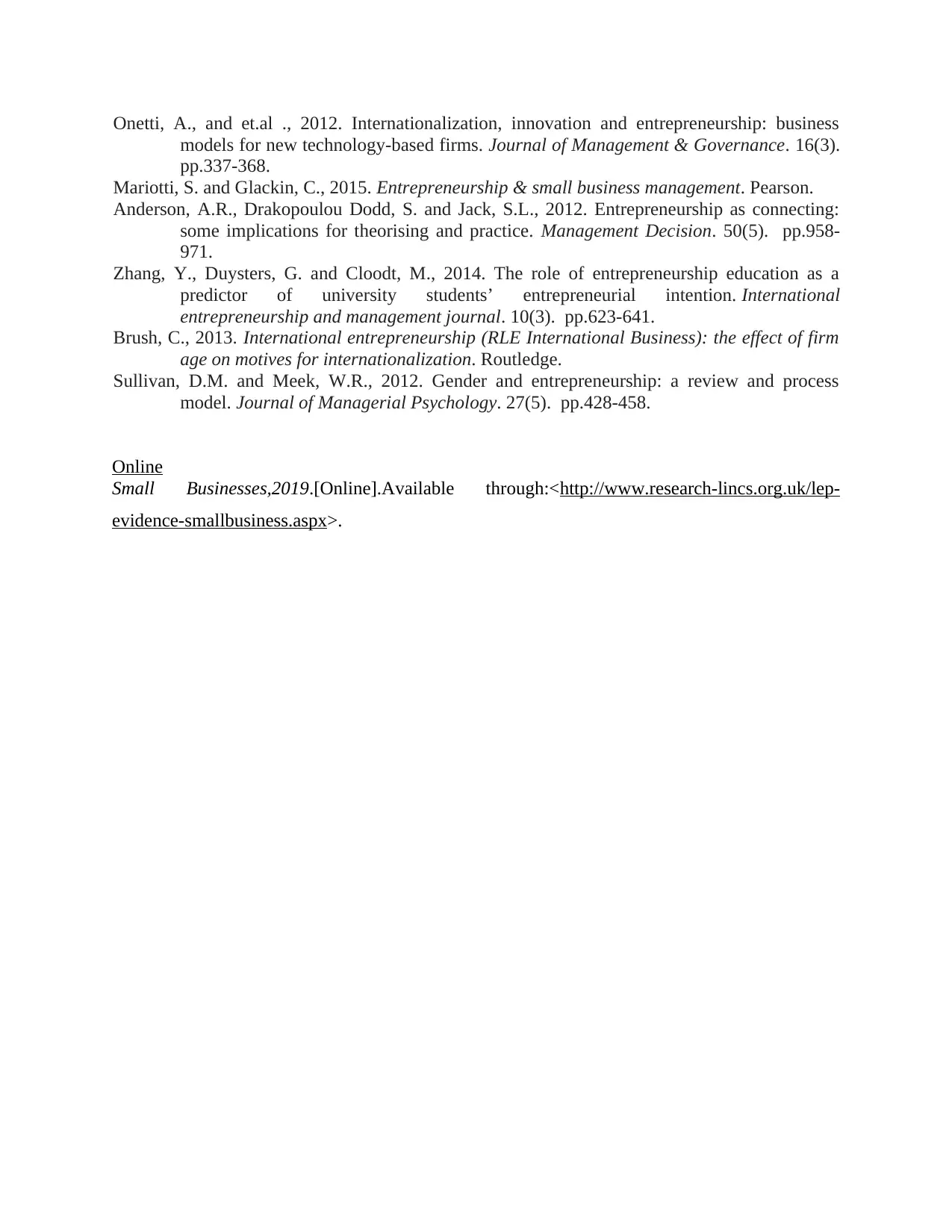
Onetti, A., and et.al ., 2012. Internationalization, innovation and entrepreneurship: business
models for new technology-based firms. Journal of Management & Governance. 16(3).
pp.337-368.
Mariotti, S. and Glackin, C., 2015. Entrepreneurship & small business management. Pearson.
Anderson, A.R., Drakopoulou Dodd, S. and Jack, S.L., 2012. Entrepreneurship as connecting:
some implications for theorising and practice. Management Decision. 50(5). pp.958-
971.
Zhang, Y., Duysters, G. and Cloodt, M., 2014. The role of entrepreneurship education as a
predictor of university students’ entrepreneurial intention. International
entrepreneurship and management journal. 10(3). pp.623-641.
Brush, C., 2013. International entrepreneurship (RLE International Business): the effect of firm
age on motives for internationalization. Routledge.
Sullivan, D.M. and Meek, W.R., 2012. Gender and entrepreneurship: a review and process
model. Journal of Managerial Psychology. 27(5). pp.428-458.
Online
Small Businesses,2019.[Online].Available through:<http://www.research-lincs.org.uk/lep-
evidence-smallbusiness.aspx>.
models for new technology-based firms. Journal of Management & Governance. 16(3).
pp.337-368.
Mariotti, S. and Glackin, C., 2015. Entrepreneurship & small business management. Pearson.
Anderson, A.R., Drakopoulou Dodd, S. and Jack, S.L., 2012. Entrepreneurship as connecting:
some implications for theorising and practice. Management Decision. 50(5). pp.958-
971.
Zhang, Y., Duysters, G. and Cloodt, M., 2014. The role of entrepreneurship education as a
predictor of university students’ entrepreneurial intention. International
entrepreneurship and management journal. 10(3). pp.623-641.
Brush, C., 2013. International entrepreneurship (RLE International Business): the effect of firm
age on motives for internationalization. Routledge.
Sullivan, D.M. and Meek, W.R., 2012. Gender and entrepreneurship: a review and process
model. Journal of Managerial Psychology. 27(5). pp.428-458.
Online
Small Businesses,2019.[Online].Available through:<http://www.research-lincs.org.uk/lep-
evidence-smallbusiness.aspx>.
1 out of 18
Related Documents
Your All-in-One AI-Powered Toolkit for Academic Success.
+13062052269
info@desklib.com
Available 24*7 on WhatsApp / Email
![[object Object]](/_next/static/media/star-bottom.7253800d.svg)
Unlock your academic potential
© 2024 | Zucol Services PVT LTD | All rights reserved.




